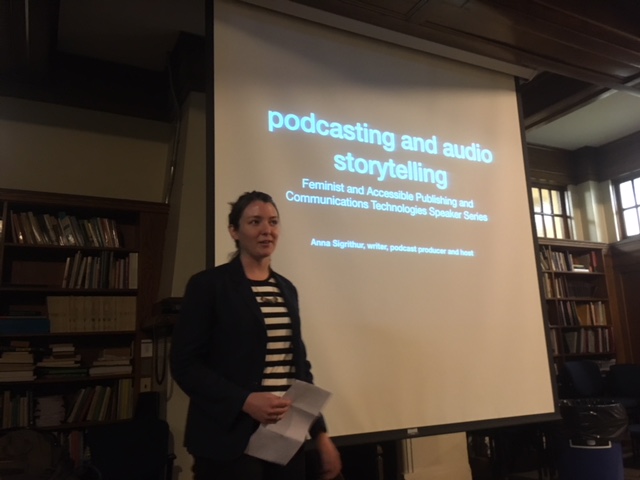For the 20th event in the Feminist and Accessible Publishing and Communications Technologies Speaker Series, podcaster Anna Sigrithur led a Feminist Podcasting Workshop on Jan. 10 in Wilson Hall.
With about 20 participants, the workshop was an interactive and judgement-free space. Sigrithur began by describing the most common podcast formats, breaking down the elements of each. From there, participants worked in small groups to write a short script that could be edited over with sound effects and background music. Sigrithur demonstrated how to achieve desired effects by using the open-load audio-recording and editing application ‘Audacity’ which is available online. Finally, attendees were given time to discuss their ideas for podcasts and share them with the rest of the group.
The speaker series, organized by Dr. Alex Ketchum, a faculty lecturer at the Institute for Gender, Sexuality and Feminist Studies, is composed of 25 workshops and discussions, seeking to bring together scholars, creators, and people within the communications industry, in order to look at the intersections of digital humanities, computer science, feminist studies, disability studies, 2SLGBTQIA+ history and critical race theory.
“One of the reasons I decided to start this series was the thought about communities, scholars, traditional forms of academic publishing and even technologies as being sexist, classist, racially biased and inaccessible,” Ketchum said. “The kinds of solutions that [can often seem proper] actually don’t really change these problems, such as open access […] and oftentimes we end up [romanticizing and] fetishizing technological alternatives [without looking] at how that could be perpetuated.”
Entirely self-taught in the art of podcasting, Sigrithur has no university degrees or formal training, but created the ‘Nordic Food Lab Radio Podcast’ in 2008, and also produced ‘OxTales,’ a series of podcasts from Oxford University’s Symposium on Food and Cookery.
“I hope that is encouraging to you [and demonstrates how] you can learn how to do some of these things and really [get] yourself [into podcasting],” Sigrithur said.
The speaker series focussed on two main approaches to accessible publishing and communications. The first involves providing a place for theoretical and activist applications of publishing and communications concepts. The second aims to create a space for workshops and teaching practical communications skills.
Sigrithur’s workshop fell into this second category, with an overview of the main podcast formats, the tools needed to start your own, and a number of group activities to encourage comfortability with free podcasting technology, as well as brainstorming podcast ideas.
Sigrithur believes that podcasting is more accessible that many believe it to be.
“I don’t have any fancy technology [with me today], I [just] have my smartphone [.…] This is because I really do want to emphasize that podcasting, like many things, is not about technology,” Sigrithur said. “It’s about how well you understand the form, how clearly you come up with your ideas, and how well you are able to execute the content.”
Sigrithur aimed to demystify the notion that podcasts are difficult to create. Many attendees came in with ideas for podcasts that they had for a number of years and discovered that starting a podcast can be done with readily available technology. Colin Maynard-Rier, U3 Arts, commented on the lack of hands-on training of the event, but he still learned a lot from attending.
“[The workshop could have benefitted from] an opportunity to go through editing on [Audacity] itself,” Maynard-Rier said. “There is really such a low barrier to starting to podcast.”
The workshop’s focus on the use of technology available online makes the daunting prospect of starting a radio show available to all members of society, no matter their gender, sexual orientation, class, or ethnicity.








